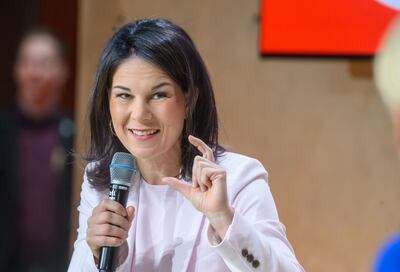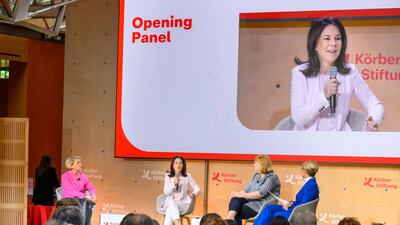German Foreign Minister Annalena Baerbock has called on Europeans to "play it smart" after Donald Trump's victory in the US election raised fears that he may cut aid to Ukraine and push it to accept an unfavourable peace deal with Russia.
Addressing the Berlin Foreign Policy Forum on Tuesday, Ms Baerbock said: "There can be only peace in Europe with Europeans, and especially with Ukraine, so there cannot be any peace negotiations over the head of Ukraine. We have to be even more focused, more clear on what we are standing for, in a shorter time than expected."
Mr Trump and Russian President Vladimir Putin like to speak to each other in person, Ms Baerbock said, in an apparent reference to experience gathered by former German chancellor Angela Merkel.
"We have to also adapt to this new situation. Play it smart," Ms Baerbock said. "What smart means, we have to see in the upcoming weeks and months."
Mr Putin last week congratulated Mr Trump on his win, calling him a "real man". Mr Trump said during campaigning that he could bring peace in Ukraine within 24 hours if elected but has given few details on how.
Europe has spent about $125 billion on supporting Ukraine since Russia's 2022 invasion, while the US has provided $90 billion, according to a tracker from the Kiel Institute, a German research body.
Ms Baerbock has previously expressed fears that Russia could take advantage of the US post-election transition period to press Moscow's advantage in Ukraine.
On Tuesday, she reaffirmed calls for Germany to increase defence spending, in what sounded like an appeal to loosen national debt rules which have been at the centre of recent political rows.
Earlier this year, Germany met a Nato target of spending at least 2 per cent of GDP on defence for the first time in decades.
"We have to invest definitely more, definitely also going closer to 3 per cent, like Poland and others are doing," Ms Baerbock said. "But the crucial point is about capabilities, the complementarity with other Nato partners."
Ms Baerbock also said it was important to collaborate with Global South countries, including South Africa, Brazil and Gulf nations, to help negotiate a peace deal between Russia and Ukraine.

This may deter Russia from attacking peace monitoring missions on the ground in future, Ms Baerbock added, referring to its targeting of the now-defunct civilian Organisation for Security and Co-operation in Europe, a special monitoring mission to Ukraine.
"If we want an agreement we can trust, it has to be an agreement which is also supported by countries which are closer to Putin, which he could not blackmail," she said. Europe would "obviously" play an important role in securing peace, Ms Baerbock added.
"It would be a bit strange – and not only for Germany but for Europeans – to say we cannot secure the peace ourselves. We are talking about standing up to our responsibility within Nato capabilities."
Germany, Europe's largest economy and Kyiv's second-biggest military backer after Washington, would play its part, Ms Baerbock said.
There are fears that if Ukraine has to accept a humiliating defeat on the battleground, other countries bordering Russia may be further destabilised. Moldova's pro-EU leadership has accused Russia of bribing some of its voters in a recent election. "The picture is way bigger than just Ukraine," Ms Baerbock said.


